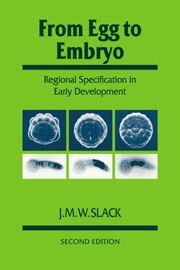Book contents
- Frontmatter
- Contents
- Preface to the second edition
- Preface to the first edition
- 1 Regional specification in animal development
- 2 The concepts of experimental embryology
- 3 Theoretical embryology
- 4 Hierarchies of developmental decisions
- 5 Development with a small cell number
- 6 Models for Man: the mouse and the chick
- 7 The breakthrough
- 8 What does it all mean?
- Appendix: How to write a program for development
- References
- Index
3 - Theoretical embryology
Published online by Cambridge University Press: 16 October 2009
- Frontmatter
- Contents
- Preface to the second edition
- Preface to the first edition
- 1 Regional specification in animal development
- 2 The concepts of experimental embryology
- 3 Theoretical embryology
- 4 Hierarchies of developmental decisions
- 5 Development with a small cell number
- 6 Models for Man: the mouse and the chick
- 7 The breakthrough
- 8 What does it all mean?
- Appendix: How to write a program for development
- References
- Index
Summary
As the science of embryology has matured, certain of its ideas have taken on mathematical form. Among the most important of these are the concepts of cell state, bistability, symmetry breaking and the morphogen gradient. Although these ideas still exist mainly in the form of mathematical models, we are entering a time when they are also becoming an empirical reality. A few years ago such models were often dismissed as mere speculation, but now no serious student of the subject can afford to ignore them.
CELL STATES
Most of what we think we know about cell states is derived from the observed properties of the histologically distinguishable cell types in the adult animal and it is often assumed that embryonic cells are like adult cells except that they are expressing different sets of genes. However, there are important differences. In the human there are about 2–300 cell types ranging from red blood cells through fibroblasts and secretory epithelia to the different pharmacological classes of neuron. The cell types that we can see are notable in three respects. They are, on the whole, qualitatively distinct from one another without intermediate forms. They persist for long periods of time and they conserve their cell type on division.
- Type
- Chapter
- Information
- From Egg to EmbryoRegional Specification in Early Development, pp. 34 - 66Publisher: Cambridge University PressPrint publication year: 1991
- 4
- Cited by

